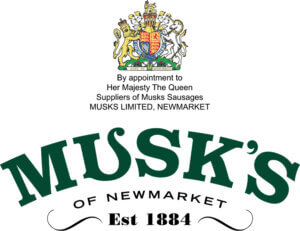To find out just why the town of Newmarket is famed for its sausages we asked local expert, Sandra Easom, Chair of the Newmarket Local History Society. Here is what she said:
“Newmarket has long been famous for its delicious, quality sausages and such is their status that they are even awarded as a prize in the Town Plate, Newmarket’s oldest horse race.
East Anglia has a long tradition of rearing quality pork. Today there are still many local free-range pork farms. Certainly, Anglo-Saxon folk kept pigs, although they were a little different to those bred today, being closer in appearance to wild boar and rather hairy! There is evidence that local Anglo-Saxons grazed livestock on Newmarket Heath and pigs were undoubtedly among those animals.
Medieval folk dwelt on numerous long, narrow strip farms running out from Newmarket High Street. These tiny plots typically contained a hut-type accommodation (a hovel), some crops, a few chickens and a cow. The pigs were in a pen – or they would dig up and eat all the crops! They were fed all the waste and scraps, plus whatever could be gleaned for them locally.
Newmarket became famous for its horses, of course, from the 17th century onwards with the arrival of the Stuart Kings. Thus, its micro farms declined in favour of stables, grander accommodation and, further out of the town, the many stud farms. Food was now being transported over short distances for sale in towns and cities, so extra supplies could be brought in to supplement Newmarket’s growing needs.
However, something which did not change was the presence of pigs – now kept in stable yards. The traditional layout of old stables included a walled section in the middle of the yard into which all scraps and waste were thrown. Here the pigs did a magnificent clean-up and recycling job before unusable waste was removed for composting.
Full-grown pigs were eventually butchered to supplement the fairly poor diet available to the majority of people. Pork sausages were a relatively cheap food, but popular with poor and rich alike. Newmarket man Billy Blythe was a stable lad before the First World War, when he became a soldier and went off to fight. His diverse memories are recorded in a Newmarket Local History Society book, “A Racing Lad Steps Out”. In this Billy said of the stable pigs that all of the pig was used somehow, “Except his squeak”!
At the other end of the social catering spectrum, Musk’s received a Royal Warrant to supply King George V and his household with sausages. Musk’s still hold a Royal Warrant today. Consignments of sausages went speedily to various royal kitchens by rail, even as far as Balmoral, wherever the Royal Family was in residence. The order always included enough for the staff.
A count-up of the late 19th century Newmarket butchers’ shops from town directories reveals that there were around 19. Each produced sausages to their own, closely-guarded, secret recipes. Other butchers simply traded in the weekly markets which then lined both sides of the High Street,
Newmarket sausages had achieved enormous status by then. Visitors to the races vied to get sausage supplies to take home. A type of sausage “black market” sprang up with under-the-counter deals as demand inflated prices.



Today, Newmarket Sausages, are an affordable status food with a legal Protected Geographical Indication (PGI). So, a Newmarket sausage can legally only be made in Newmarket. The Members of today’s Newmarket Sausage Association, are Powters, Musk’s and Eric Tenant Quality Butchers. Each still produces sausages from unique recipes and prime cuts of meat. ”
Therefore, it is very appropriate that the town should have its very own Sausage Festival. Working with our sausage producers we are looking forward to the first Newmarket Sausage Festival – a week long celebration between 31st October and 6th November 2023). Click here for more details.
To find out more about the town’s history head to the Newmarket Local History Society.

08/04/2024
Discover Newmarket Enters New Partnership with National Horseracing Museum
Discover Newmarket will manage Visitor Services on behalf of the National Horseracing Museum in an exciting new partnership agreed last week.
18/03/2024
The Story of The Tin Man
Retiring as a living legend at the National Stud
Since arriving at the National Stud in April 2022, this retired legend is most definitely a firm favourite amongst our tour attendees.
06/03/2024
Easter Activities in and around Newmarket
With Easter just around the corner, there’s the promise of warmer weather and the chance to celebrate over the long weekend, is in sight.
29/02/2024
Time called for long-standing employee, Alan Grimwood, at Corney and Barrow
Alan is a familiar face to many in and around Newmarket as he drives the Corney and Barrow branded, red van delivering wines and spirits.
19/02/2024
Ely Cathedral: A Celebration of Bridal Gowns Exhibition
Just a stones throw away from Newmarket, Ely Cathedral is highly regarded by historians and architects from all over the world for its beauty and size.
31/01/2024
Your Guide to making Valentine’s Day Special
Show them how much they’re loved, with our special Valentine’s Day Guide.
Visit East of England and see where they became Master of the Air!
18/01/2024
Become a Tour Guide with Discover Newmarket
Discover Newmarket is the official tourism body for Newmarket and the surrounding area, responsible for promoting Newmarket as a key destination for the East of England.



